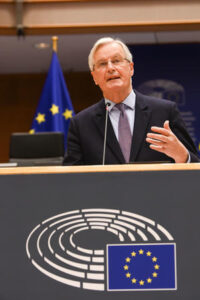The former EU Brexit negotiator faces a challenging political landscape after being chosen to lead France’s government amid a divided parliament.

French President Emmanuel Macron has named Michel Barnier, a seasoned politician and former chief EU Brexit negotiator, as the new Prime Minister. Barnier’s appointment comes nearly two months after France’s snap elections resulted in a political stalemate, with the National Assembly split between three major political factions, none of which holds a clear majority.
At 73, Barnier brings decades of experience to the role, having served in various senior positions in both French and European politics. Known in France as “Monsieur Brexit” for his role in leading the EU’s negotiations with the UK, Barnier is now tasked with forming a stable government capable of navigating the political divisions in France’s legislature.
Barnier will succeed Gabriel Attal, who has been acting as caretaker Prime Minister since July. Attal, France’s youngest-ever prime minister, was initially appointed in early 2024 but has stayed on during the interim period while Macron deliberated on his next choice.
The new Prime Minister faces immediate challenges, including pushing through France’s 2025 budget, which must be presented to the National Assembly by October 1. His predecessor, Attal, began drafting a provisional budget, but Barnier will need to leverage his extensive political skills to secure approval from lawmakers. With the Assembly fragmented, securing a majority will be difficult, particularly with opposition from the left-wing New Popular Front (NFP) and far-right National Rally (RN).
Barnier’s nomination has already sparked backlash from Jean-Luc Mélenchon, leader of the leftist France Unbowed (LFI), the largest faction within the NFP. Mélenchon has criticized Macron’s decision, arguing that the presidency has ignored the election results, which saw the NFP claim a plurality of seats. He called for protests against Barnier’s appointment, claiming the new government represents a collaboration between Macron and far-right leader Marine Le Pen.
Le Pen, however, distanced herself from Barnier’s administration, stating her party would not participate, but she acknowledged that Barnier’s experience might prove beneficial. Jordan Bardella, the president of the RN, also indicated that the far-right party would assess Barnier’s performance, focusing on his stance on key issues such as immigration and the cost of living.
Barnier’s political future now hinges on winning a vote of confidence in the National Assembly, requiring 289 out of 577 MPs to support his government. With opposition already mounting and protests being planned, Barnier will need all of his diplomatic expertise to navigate the challenging weeks ahead.
President Macron, whose term extends until 2027, has faced criticism for his handling of France’s political crisis. His decision to call snap elections in June, which resulted in his centrist coalition losing to the left-wing New Popular Front, has been viewed by many as a misstep. A recent poll revealed that over half of French voters believe Macron should resign, though such a move is unlikely.
Looking ahead, Barnier’s success will be closely watched, particularly by former Prime Minister Édouard Philippe, who has already hinted at his plans to run for president in 2027. As Barnier takes on the daunting task of uniting a fractured parliament, his ability to deliver stability will be critical for both his own future and Macron’s legacy.
(Associated Medias) – Tutti i diritti sono riservati
